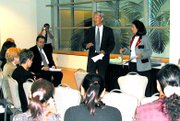Delegation Looks for U.S. Apparel Brands to Bring to China
Southern California has something China wants. And a group of Chinese manufacturers and retailers was in town looking for it.
A delegation of Chinese businesspeople, organized under the auspices of the U.S. Department of Commerce and the U.S. Embassy in China, was on a two-week tour that hit the fashion high points of the United States.
After experiencing the awe of MAGIC International in Las Vegas, one of the largest apparel trade shows in the country, the group came to Los Angeles to visit the California Market Center and learn about the various Los Angeles labels and brands that might appeal to the Chinese consumer.
Wang Ping, who is the general manager of Yidaimingliu Clothing Co. in Qingdao, China, said she wanted to find brands or labels that appeal to women ages 30 to 50.
“We have two stores in Qingdao,” Wang said through a translator. “But we also sell products in other department stores. We are hoping that we can attract more customers with American products.”
Wang said the U.S. fashion industry is in the spotlight—particularly California fashions that are on the cutting edge. “I believe U.S. products are more trendy and casual, and this really appeals to the Chinese consumer,” she said.
About a dozen Chinese visitors met on Aug. 29 with several fashion industry members, pulled together by the California Fashion Association, who explained how the American system of showrooms and sales representatives works. They also got a crash course in freight forwarding and U.S. customs law.
Lyne Lee, a partner in Los Angeles–based Trina Turk, said in Chinese that the small apparel company, which incorporates a lot of vintage clothing into its line, would like to sell and manufacture more of its goods in China. Currently about 20 percent of the Trina Turk line, primarily sweaters, come from Hong Kong. “I hope that one day, when our production is in China, we will be more famous and well-known there,” she said.
Shi Yuzhang, general manager of Wewant, an economic- and trade-development company, shared that he was interested in representing U.S. brands in China. “There are many U.S. companies that want to go to China,” he said in Chinese.
But, he said, he was confused about how to figure out which brand names wanted to go to China and how to contact them.
Ilse Metchek, executive director of the California Fashion Association, suggested he return in November for Los Angeles Fashion Week, when local designers flood the catwalk with their latest lines and the fashion district buzzes with activity. Then he could get an idea of what was really happening in the area, she said.
Lynne Sperling, a principal with Los Angeles consulting firm The Sperling and Hileman Group LLC, suggested he contact a buying office or a predictive-services company to point him in the right direction after he decided on the type of apparel he was looking for.
When Shi commented that this would be complicated and take a year to do, another of the group’s participants suggested he send an e-mail to a buying office, identifying what he needs.
Bruce Berton, director of international business consulting for Stonefield Josephson Inc. in Santa Monica, Calif., warned that some companies hesitate to go to China because they fear their brands will be copied and sold on the streets. He noted that one of his clients—Los Angeles junior manufacturer Hot Kiss Inc., headed by Moshe Tsabag—is opening 200 free-standing stores in China over the next five years as part of a long-term licensing agreement signed with Zhejiang Xuege Fashion Co. Ltd., the retail arm of one of China’s largest apparel conglomerates.
“Moshe will supply only the merchandising ideas, and the owner of the stores has to protect the Hot Kiss name in China,” Berton said.
The Hot Kiss deal was brokered by Van Nuys, Calif.–based Cherokee Inc., which the Chinese delegation visited shortly after touring the CMC.
On Labor Day, the visitors went to New York, where they met with the Greater Blouse, Skirt & Undergarment Association, headed by Bobby Cheung. From there, they returned home.
This was the first fashion trade delegation that the U.S. Embassy in Beijing has organized in many years, said Shen Yan, the commercial assistant at the embassy.
“We do two trade missions a year,” he said. “Last April, we took a franchise delegation to Washington, D.C. The purpose of this trip is to help Chinese fashion companies look for reputable U.S. brands to bring into China. They are all interested in bringing U.S. brands to China.” —Deborah Belgum






















